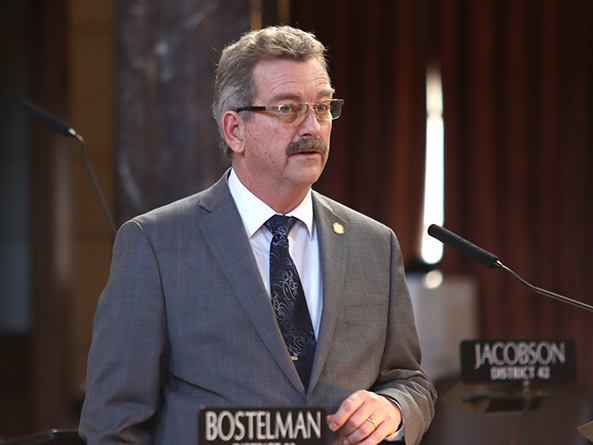Additional authority for environmental regulator advanced
Lawmakers gave first-round approval March 11 to a bill intended to give a state agency the ability to respond more quickly to the release of pollution.
LB1102, introduced by Sen. Bruce Bostelman of Brainard, would authorize the director of the state Department of Environment and Energy to issue an order requiring a person responsible for releasing a pollutant to clean it up or take action to clean it up if that person fails or refuses to do so.
If the state responds to a release, the responsible person would be liable to the state for cleanup costs, which would become a lien on any real property owned by the person and subject to or affected by the cleanup.
LB1102 also would authorize the director to issue a cease and desist order if the director finds that a person has performed any act that presents or may present “substantial” harm to the environment. An order could assess an administrative penalty of up to $5,000 per day per violation.
“The CDO is intended to put a quick stop to situations that pose a threat or could pose a threat if no action is taken,” Bostelman said. “CDOs could also be used in non-emergency situations rather than waiting for conditions to evolve into emergencies.”
Finally, LB1102 would authorize the director to allow another person, entity or responsible person to remediate site conditions voluntarily under the Remedial Action Plan Monitoring Act instead of issuing a cleanup order. As introduced, the bill would allow the director to waive requirements that apply to voluntary remediation.
Under a Natural Resources Committee amendment, adopted 40-0, the director could not waive those requirements.
Bostelman said the amendment also would clarify that the bill’s requirements would apply to individuals, companies or other entities responsible for a release and that a cleanup must conform with federal and state environmental standards. Additionally, it would clarify that pollutants, for purposes of the act, are substances that are harmful to plant and animal life, he said.
Finally, the amendment would require the state treasurer to transfer $300,000 from the state general fund to a new cash fund that the department would use to pay cleanup costs and collect recovered funds.
Omaha Sen. John Cavanaugh supported the bill. He said LB1102, and the interim study that led to its introduction, is a response to “weaknesses” in the state’s regulatory process revealed by past pollution events, including the one at the AltEn ethanol plant near Mead.
The bill is intended to give the department the tools it needs to address future events while also ensuring that it has discretion to act, Cavanaugh said.
“You want to make [the language] strong but not so cumbersome that we are forcing the agency to take action when it’s not necessary,” he said. “That is a hard … needle to thread.”
Sen. Carol Blood of Bellevue also supported the bill but said it would not do enough to prevent future pollution events by correcting regulatory “gaps” that led to the release at AltEn.
LB1102 advanced to select file on a vote of 40-0.


